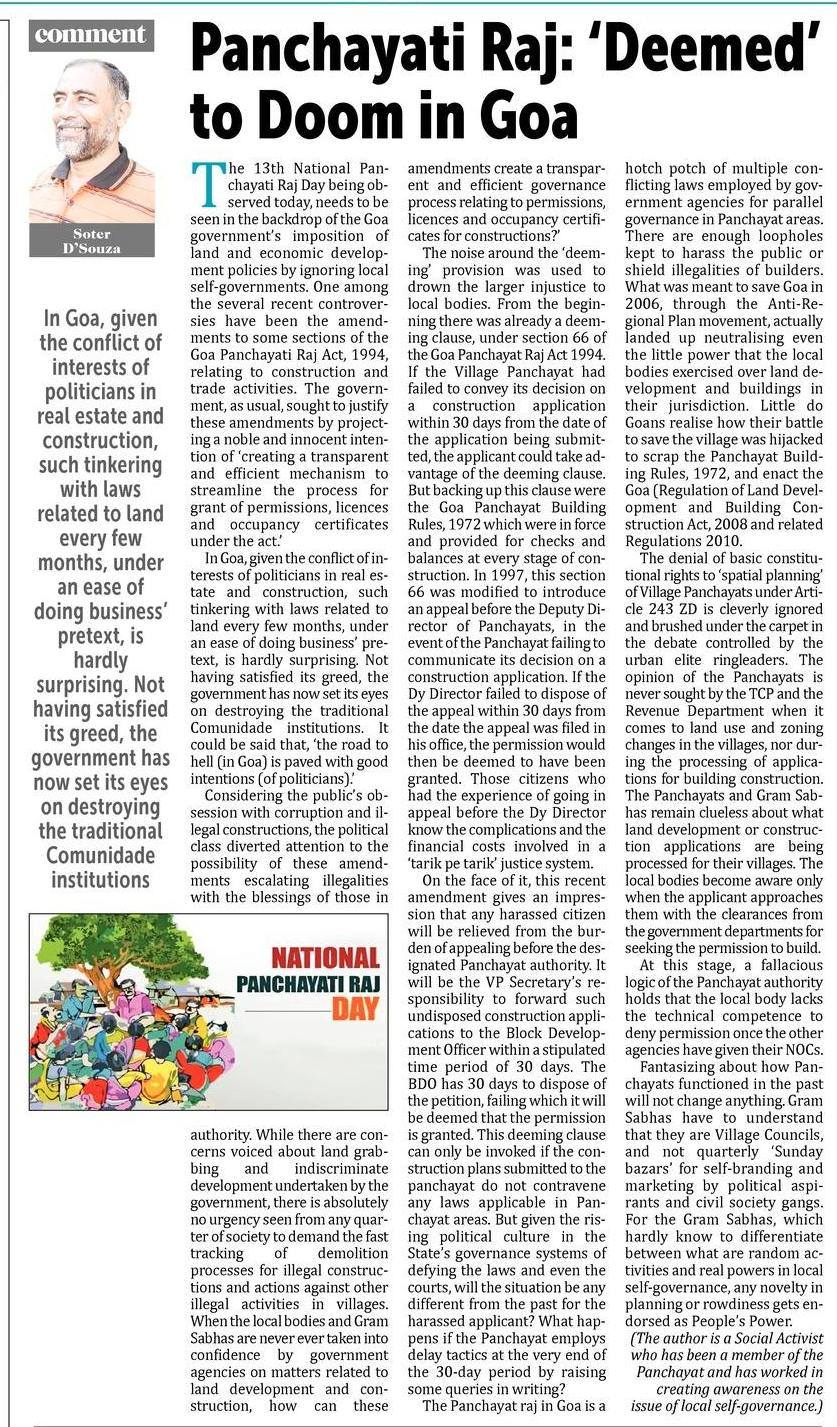Lead Article published in oHerald April, 24, 2023
The 13th National Panchayati Raj Day being observed today, needs to be seen in the backdrop of the Goa government’s imposition of land and economic development policies by ignoring local self-governments. One among the several recent controversies have been the amendments to some sections of the Goa Panchayati Raj Act, 1994, relating to construction and trade activities. The government, as usual, sought to justify these amendments by projecting a noble and innocent intention of ‘creating a transparent and efficient mechanism to streamline the process for grant of permissions, licences and occupancy certificates under the act.’
In Goa, given the conflict of interests of politicians in real estate and construction, such tinkering with laws related to land every few months, under an ease of doing business’ pretext, is hardly surprising. Not having satisfied its greed, the government has now set its eyes on destroying the traditional Comunidade institutions. It could be said that, ‘the road to hell (in Goa) is paved with good intentions (of politicians).’
Considering the public’s obsession with corruption and illegal constructions, the political class diverted attention to the possibility of these amendments escalating illegalities with the blessings of those in authority. While there are concerns voiced about land grabbing and indiscriminate development undertaken by the government, there is absolutely no urgency seen from any quarter of society to demand the fast tracking of demolition processes for illegal constructions and actions against other illegal activities in villages. When the local bodies and Gram Sabhas are never ever taken into confidence by government agencies on matters related to land development and construction, how can these amendments create a transparent and efficient governance process relating to permissions, licences and occupancy certificates for constructions?’
The noise around the ‘deeming’ provision was used to drown the larger injustice to local bodies. From the beginning there was already a deeming clause, under section 66 of the Goa Panchayat Raj Act 1994. If the Village Panchayat had failed to convey its decision on a construction application within 30 days from the date of the application being submitted, the applicant could take advantage of the deeming clause. But backing up this clause were the Goa Panchayat Building Rules, 1972 which were in force and provided for checks and balances at every stage of construction. In 1997, this section 66 was modified to introduce an appeal before the Deputy Director of Panchayats, in the event of the Panchayat failing to communicate its decision on a construction application. If the Dy Director failed to dispose of the appeal within 30 days from the date the appeal was filed in his office, the permission would then be deemed to have been granted. Those citizens who had the experience of going in appeal before the Dy Director know the complications and the financial costs involved in a ‘tarik pe tarik’ justice system.
On the face of it, this recent amendment gives an impression that any harassed citizen will be relieved from the burden of appealing before the designated Panchayat authority. It will be the VP Secretary’s responsibility to forward such undisposed construction applications to the Block Development Officer within a stipulated time period of 30 days. The BDO has 30 days to dispose of the petition, failing which it will be deemed that the permission is granted. This deeming clause can only be invoked if the construction plans submitted to the panchayat do not contravene any laws applicable in Panchayat areas. But given the rising political culture in the State’s governance systems of defying the laws and even the courts, will the situation be any different from the past for the harassed applicant? What happens if the Panchayat employs delay tactics at the very end of the 30-day period by raising some queries in writing?
The Panchayat raj in Goa is a hotch potch of multiple conflicting laws employed by government agencies for parallel governance in Panchayat areas. There are enough loopholes kept to harass the public or shield illegalities of builders. What was meant to save Goa in 2006, through the Anti-Regional Plan movement, actually landed up neutralising even the little power that the local bodies exercised over land development and buildings in their jurisdiction. Little do Goans realise how their battle to save the village was hijacked to scrap the Panchayat Building Rules, 1972, and enact the Goa (Regulation of Land Development and Building Construction Act, 2008 and related Regulations 2010.
The denial of basic constitutional rights to ‘spatial planning’ of Village Panchayats under Article 243 ZD is cleverly ignored and brushed under the carpet in the debate controlled by the urban elite ringleaders. The opinion of the Panchayats is never sought by the TCP and the Revenue Department when it comes to land use and zoning changes in the villages, nor during the processing of applications for building construction. The Panchayats and Gram Sabhas remain clueless about what land development or construction applications are being processed for their villages. The local bodies become aware only when the applicant approaches them with the clearances from the government departments for seeking the permission to build.
At this stage, a fallacious logic of the Panchayat authority holds that the local body lacks the technical competence to deny permission once the other agencies have given their NOCs.
Fantasizing about how Panchayats functioned in the past will not change anything. Gram Sabhas have to understand that they are Village Councils, and not quarterly ‘Sunday bazars’ for self-branding and marketing by political aspirants and civil society gangs. For the Gram Sabhas, which hardly know to differentiate between what are random activities and real powers in local self-governance, any novelty in planning or rowdiness gets endorsed as People’s Power.
(The author is a Social Activist who has been a member of the Panchayat and has worked in creating awareness on the issue of local self-governance.)
https://www.heraldgoa.in/Edit/Opinions/Panchayati-Raj-%E2%80%98Deemed%E2%80%99-to-Doom-in-Goa/204156?fbclid=IwAR0xmV2nnZ4xNZVvK3jYckHkGntuV6SWH8JBsXtz2U5G96Y1eykl7rRqGh4

No comments:
Post a Comment